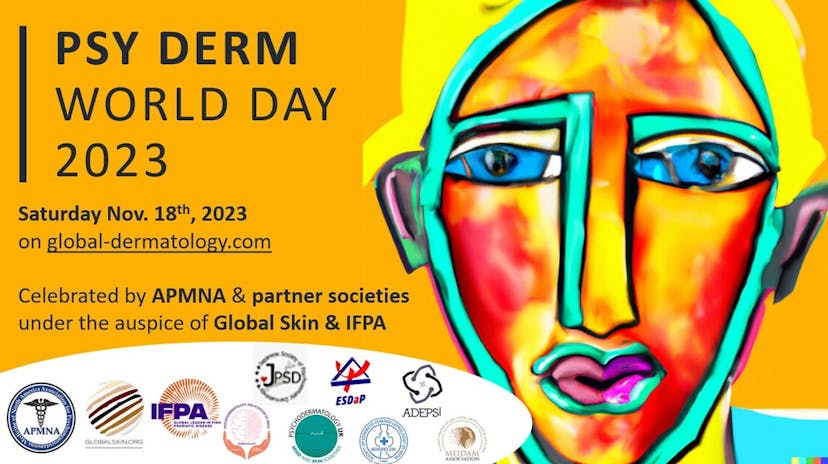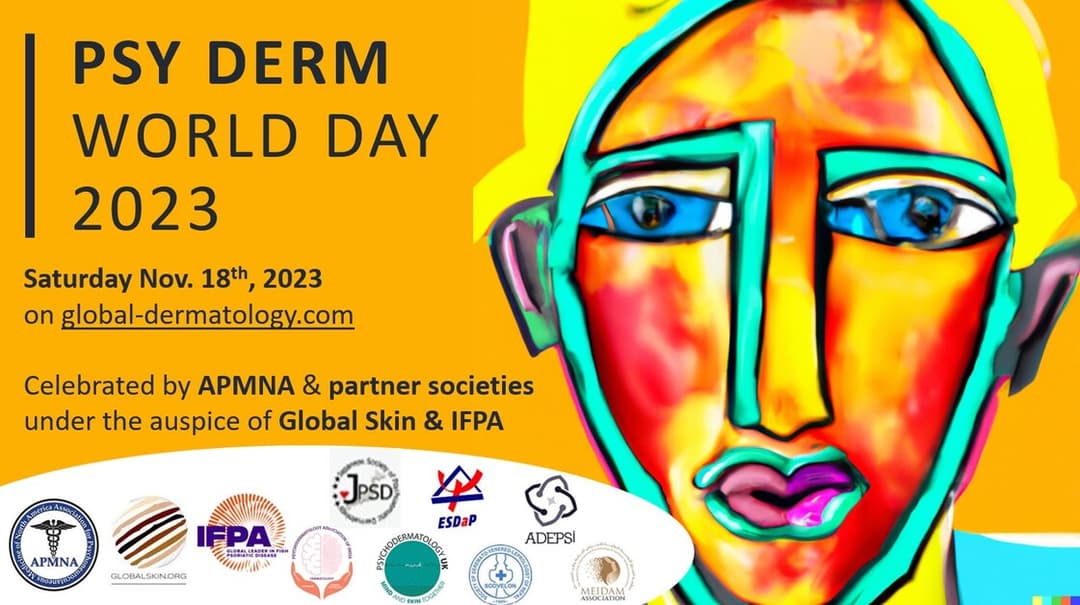
2023-11-18
PSYDERM | World Day 2023APMNA (Association for Psychoneurocutaneous Medicine of North America)
Accreditation
PSYDERM | World Day 2023
global-dermatology.com
2023-11-18
Organized by APMNA (Association for Psychoneurocutaneous Medicine of North America)

2023-11-18
PSYDERM | World Day 2023APMNA (Association for Psychoneurocutaneous Medicine of North America)
Accreditation
INTRODUCTION
07:00 - 07:10
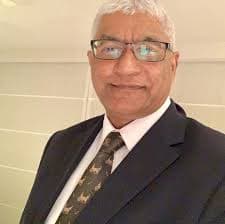
Introduction to Psychoderm 2023
Professor at Central Michigan University in Saginaw, Michigan. My areas of interest Psychodermatology and Psychiatric aspects of hair disease. Psychotrichology, Skin picking and delusions of parasitosis are my other areas of interest and expertise. I am currently Executive Secretary of Association for Psychocutaneous Medicine of North America. I am author and editor of several books on Psychodermatology.
07:10 - 07:10

Patient Perspective 1
Professor at Central Michigan University in Saginaw, Michigan. My areas of interest Psychodermatology and Psychiatric aspects of hair disease. Psychotrichology, Skin picking and delusions of parasitosis are my other areas of interest and expertise. I am currently Executive Secretary of Association for Psychocutaneous Medicine of North America. I am author and editor of several books on Psychodermatology.
07:10 - 07:17

Patient Perspective 2
Silvia Fernandez Barrio
PSYCHIATRIC DISEASES IN DERMATOLOGY
Dr. Maria-Angeliki Gkini, UK
08:00 - 08:15

Management of Dermatological Delusional Disorders
Dermatologist and director of the University of California at San Francisco Psoriasis and Skin Treatment Center.
Koo's research interests include psoriasis therapies, phototherapy, eczema, psychodermatology (the connection between mental stress and skin health) and quality of life issues.
Koo earned his medical degree from Harvard University. He completed a residency in psychiatry at the University of California, Los Angeles, followed by a residency in dermatology at UCSF.
Koo serves on the editorial board for the Journal of the American Academy of Dermatology.
08:15 - 08:30
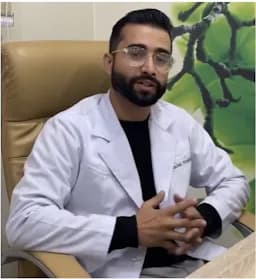
Holistic Treatment Approach in Management of Skin Diseases: How often do we incorporate Psychological aspect of Skin diseases?
As an eminent and aspiring young dermatologist currently working under government hospital in Nepal, Dr Prajwal Pudasaini is a European Scholarship Awardee of 2021, along with the recent award from international society of dermatology. his academic inclination has been proven by his numerous lectures that he has delivered in International Congress of Dermatology 2021, European Congress of Dermatology 2021, European Symposium 2021, South Asian Regional Congress of Dermatology, Indian Congress of Dermatology and numerous webinars that he has conducted. His community outreach program on delivering skin care services to rural Nepal and school children is also taking a pace in his homeland. He has served in the rural Nepal and provided Dermato-Venereology Camps with free medicines. He has conducted many Health Camps free of cost in rural Nepal. With numerous national and international journals and many on pipelines hes definitely a scholar to listen to.
08:30 - 08:45

Psychotrichological approach in the management of patients with hair diseases
Professor of Department of General and Clinical Immunology and Allergology of V.N. Karazin Kharkiv National University
Founder and Director of the "Institute of Trichology" – clinical, research and training center
Founder and President of the Ukrainian Hair Research Society (UHRS)
Board Member of the European Hair Research Society (EHRS) 2014-2017
Member of the Membership committee of the European Hair Research Society (EHRS)
Author and supervisor of the national thematic advanced training "Modern methods of diagnosis and treatment in trichology" for dermatologists in Ukraine
Medical Editor of "Dermatologist" (Russian-language version of the journal "Der Hautarzt"), member of the editorial board of "Trichology" journal at "Cosmetics and Medicine" publishing house
Co-founder of the patient organization "Alopecia School" in Ukraine
Author and co-author of over 100 scientific papers on trichology, 5 patents; co-author of guidelines for doctors, interns, and students "Alopecia areata pharmacotherapy," "Modern methods of diagnosis of non scarring alopecia"; co-author of "Trichology" Guideline in Ukraine; author and co-author 5th books - the First and the Second editions of the book "Trichology", "Injection methods in cosmetology", "Age and gender cosmetology", "Trichopathy in children"
Member of the International Advisory Committee of the World Congress for Hair Research in Jeju (WCHR 2014)
Member of the International Advisory Committee of the World Congress for Hair Research in Miami (WCHR 2015)
Chair of the pre-course at the 17th EHRS Meeting in Tbilisi in 2016 (EHRS 2016)
Member of the International Advisory Committee of the World Congress for Hair Research in Kioto (WCHR 2017)
Member of the International Advisory Committee of the World Congress of Hair Trichoscopy in Warsaw (WCT 2018)
Member of the International Advisory Committee of the 18th EHRS Meeting in Bologna in 2018 (EHRS 2018)
08:45 - 09:00

Trichoscopy in self-inflicted hair loss: A valuable diagnostic tool for differential diagnosis
Nino Lortkipanidze, MD, PhD (graduated from Tbilisi Medical University, Georgia in 1996), Doctor (PhD) in Medicine (2006). Full Professor at D.Tvildiani Medical University (since 2022). Head of Department of Dermatology at MediClubGeorgia (since 2022). Head of Residency program in Dermatology and Venereology at Tbilisi Medical Academy (since 2018). President of Georgian Hair Research (since 2013). President of Eastern Europe and Asia Hair Research Society (since 2019)
Author of over 50 scientific journal articles, co-author of the book “Psychotrichology”
09:00 - 09:15

Bipolar Disorder and Skin
Im dermtologist, psychiatrist, bornes in Argentina
I founded ADEPSI an Academy to impulse the psychodermatology in Latinoamérica in my country
Actually I live in Spain doing a Neurociencias doctoraye at UAB university
09:15 - 09:30

Delusional Disorders in Dermatovenerology: Delusional Infestation and Beyond
Dmitry V. Romanov
09:30 - 09:45

Post traumatic stress disorder(PTSD) and the Dermatology patient. A clinical case
Dra. Marcia Senra is a dermatologist with over 10 years of experience, specializing in psychodermatology. She offers services linking mental health and skin health, which demonstrates her training in psychotherapy and her integrated approach to dermatological care.
09:45 - 10:00

Factitious Dermatoses (FD) treated with hypnotherapy
Dermatologist in Chevayoor Kozhikode
09:58 - 10:05

Patient Perspective 3
Professor at Central Michigan University in Saginaw, Michigan. My areas of interest Psychodermatology and Psychiatric aspects of hair disease. Psychotrichology, Skin picking and delusions of parasitosis are my other areas of interest and expertise. I am currently Executive Secretary of Association for Psychocutaneous Medicine of North America. I am author and editor of several books on Psychodermatology.
10:05 - 10:06

Patient Perspective 4
Silvia Fernandez Barrio
10:06 - 10:07

Patient Perspective 5
Professor at Central Michigan University in Saginaw, Michigan. My areas of interest Psychodermatology and Psychiatric aspects of hair disease. Psychotrichology, Skin picking and delusions of parasitosis are my other areas of interest and expertise. I am currently Executive Secretary of Association for Psychocutaneous Medicine of North America. I am author and editor of several books on Psychodermatology.
10:07 - 10:23

Panel Discussion - PSYCHIATRIC DISEASES IN DERMATOLOGY
Dr. Maria-Angeliki GKINI is a Consultant Dermatologist at 401 General Army Hospital in Athens, Greece, and a Locum Consultant Dermatologist at Barts Health NHS Trust in London. With expertise in psoriasis and inflammatory skin diseases, she has contributed to numerous research studies, spoken at international conferences, and received awards from prestigious institutions, including the European Academy of Dermatology and Venereology. Dr. Gkini’s interests also extend to artificial intelligence in dermatology and multidisciplinary approaches to skin conditions.
MENTAL HEALTH IN CHRONIC DERMATOSES
Dr. Maria-Angeliki Gkini, UK
10:23 - 10:15

Alopecia Areata: it is not just hair
Dr. Maria-Angeliki GKINI is a Consultant Dermatologist at 401 General Army Hospital in Athens, Greece, and a Locum Consultant Dermatologist at Barts Health NHS Trust in London. With expertise in psoriasis and inflammatory skin diseases, she has contributed to numerous research studies, spoken at international conferences, and received awards from prestigious institutions, including the European Academy of Dermatology and Venereology. Dr. Gkini’s interests also extend to artificial intelligence in dermatology and multidisciplinary approaches to skin conditions.
10:42 - 10:30

Psychodermatology of psoriasis
Dr. Maria-Angeliki GKINI is a Consultant Dermatologist at 401 General Army Hospital in Athens, Greece, and a Locum Consultant Dermatologist at Barts Health NHS Trust in London. With expertise in psoriasis and inflammatory skin diseases, she has contributed to numerous research studies, spoken at international conferences, and received awards from prestigious institutions, including the European Academy of Dermatology and Venereology. Dr. Gkini’s interests also extend to artificial intelligence in dermatology and multidisciplinary approaches to skin conditions.
11:00 - 10:45

Effect of stress on skin disorders in Children
Dr. Shrea Kapoor is a Dermatosurgeon,Aesthetic Dermatologist and Dermatologist in Peddar Road, Mumbai and has an experience of 8 years in these fields. Dr. Shrea Kapoor practices at Elixir Wellness in Peddar Road, Mumbai. She completed MBBS from Mahatma Gandhi Mission's Medical College, Navi Mumbai in 2016 and MD - Dermatology , Venereology & Leprosy from DY Patil University in 2020.
11:12 - 11:00

Compassion-based medicine for chronic skin diseases
Christian is professor of clinical psychology and psychological diagnostics at the Fresenius University of Applied Sciences in Hamburg.
He remains a visiting professor at Stradins University in Riga.
Christian is a psychological psychotherapist (behavioral therapy) and supervisor and, in addition to psychodermatology, he deals a lot with obsessive-compulsive disorder and related disorders, trauma-related illnesses and the promotion of compassion.
11:27 - 11:15

The Role of Lipids in Vitiligo and Schizophrenia.
Dr. Caroline Stamu-O'Brien is a psychiatrist in Brooklyn, New York, Department of Psychiatry, Aff. NYU Langone Medical Center, Woodhull Medical and Mental Health Center.
11:37 - 11:30
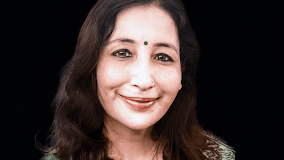
Acne, its relevance and role in Psychocutaneous Dermatology Practice
Arora Gulhima
11:48 - 11:45

Patient-Reported Impact of Dermatological Diseases (PRIDD) Measure: Quantifying psychological and social impact
Allison Fitzgerald MD
11:56 - 12:00

Cytokines - emergent role in the psychocutaneous disorders
Prof. Torello Lotti , MD, MD (Hon) Prof. Lotti is Full Professor of the Dermatology Division at University of Rome “Guglielmo Marconi”, Rome, Italy. He is President of WHA – World Health Academy, Dermatology since 2013.
He is Honorary Professor of Dermatology at China n.1 Medical University in Shenyang, China (2011), Key Lecturer at the New York Academy of Medicine for the “Howard Fox Memorial Lecture” (14 March 2012 – New York, NY – USA), and Lecturer at Boston University School of Medicine, Harvard (MA, USA 2014); he is Chair, Executive Scientific Committee of the Vitiligo Research Foundation, New York , NY USA.
He has been Full Professor of the Dermatology and Venereology Division at University of Florence School of Medicine, Florence, Italy, from 2006 to 2010.
He is Visiting Professor in six International Universities, and Key Note Lecturer in several international Dermatology Societies and Invited Speaker at the main international sectorial congresses. His activities in serving Dermatology have been numerous: President of the Italian Society of Dermatology and Venereology (SIDeMaST , 2009-2010) and President of the International Society of Dermatology ( ISD, 2009-2010), President of the European Society for Cosmetic and Aesthetic Dermatology (ESCAD, 2003-2004), Editor in Chief of the Journal of the European Academy of Dermatology and Venereology (JEADV, 1992-2002) , Editor “Therapeutic Hotline”- Dermatologic Therapy (2007-) and served as Editor in Chief of the Giornale Italiano di Dermatologia in the period of his presidency of SIDeMaST (2009-2010).
He has been President of numerous international congresses, and is Ordinary Member of the main Scientific international Societies of Dermatology (EADV, SIDEV , ESDR , ISD, AAD, SID) and Honorary Member of several Scientific Societies of the Dermatology field.
He is Honorary Life Member of the American Dermatological Association ( ADA ).
Moreover, he is a Scientific Reviewer of ten sectorial journals, among which are the British Journal of Dermatology, Journal of Investigative Dermatology, Journal of the American Academy of Dermatology , Dermatologic Therapy. Prof. Lotti is Author or co-author of over 1500 scientific publications, including scientific papers , book chapters and books. Out of these publications over 400 are peer-reviewed papers , with a cumulative Impact Factor of circa 1000.
12:17 - 12:15

Psychodermatology: Focus on the Possible Role of Eye Movement Desensitization and Reprocessing (EMDR) in Clinical Cases
Antonio C. Sison MD is the first and only board certified Psychiatrist and board certified Dermatologist in the Philippines. The reason for this dual residency is his interest in the pursing the field of Psychodermatology.
Further he is a certified in Eye Movement Desensitization Reprocessing (EMDR) Therapy as well as Master Certification in Neurolinguistics Programming (NLP). He utilizes these modalities as part of his treatment approaches for patients both psychiatric and dermatological conditions.
His Basic Framework is Trauma and how this is applied in both psychological and dermatological processes through changes in the brain circuitry may place the person at risk for both psychiatric and dermatological conditions.
His main research focus is on Psychodermatology specifically exploring the possible role of EMDR in the improvement of dermatological lesions specifically psoriasis.
Presently he is Associate Professor at the Department of Psychiatry at the University of the Philippines- Philippine General Hospital (UP-PGH). He is a consultant at the Skin and Cancer Foundation Incorporated (SCFI) and visits the Dermatology Clinic of the Quirino Memorial Medical Center.
12:29 - 12:30

Psychosocial Burden of hidradenitis suppurativa
Professor Doctor Ilknur Kivanc Altunay, Head of Dermatology and Venereology Clinic,Şişli Hamidiye Etfal Training and Research Hospital.
Head of Dermatology and Venereology Dep. of International Medicine Faculty, Unversity of Health Scienes-Turkey
12:43 - 12:45

Approaching psychosocial impact of Alopecia Areata on Patient
Master of Psychology, Lecturer at Mykoles Romeris University, Vilnius, Lithuania.
12:53 - 12:38

Patient Perspective 6
Professor at Central Michigan University in Saginaw, Michigan. My areas of interest Psychodermatology and Psychiatric aspects of hair disease. Psychotrichology, Skin picking and delusions of parasitosis are my other areas of interest and expertise. I am currently Executive Secretary of Association for Psychocutaneous Medicine of North America. I am author and editor of several books on Psychodermatology.
12:54 - 12:44

Patient Perspective 7
Silvia Fernandez Barrio
13:01 - 13:11

Panel Discussion - Mental Health in Chronic Dermatoses Discussion
Dr. Maria-Angeliki GKINI is a Consultant Dermatologist at 401 General Army Hospital in Athens, Greece, and a Locum Consultant Dermatologist at Barts Health NHS Trust in London. With expertise in psoriasis and inflammatory skin diseases, she has contributed to numerous research studies, spoken at international conferences, and received awards from prestigious institutions, including the European Academy of Dermatology and Venereology. Dr. Gkini’s interests also extend to artificial intelligence in dermatology and multidisciplinary approaches to skin conditions.
PSYCHODERMATOLOGY IN COSMETIC DERMATOLOGY
Dr. Maria-Angeliki Gkini, UK
13:11 - 13:00

Beauty and the Beast: Stress, Trauma, Skin Disease and an Embodied Approach To Healing
Dr. Keira Barr is a prominent leader in women’s medicine – creating a bridge between hormones, skin and mind-body medicine to optimize women’s mid-life experience. A fierce patient advocate and completely dedicated to uncovering the root cause of hormonal imbalances, Dr. Barr empowers women worldwide to take control of their health and their hormones in menopause.
She is an international speaker, best selling author, clinical educator, and considered a leading authority on women’s health. As a former Assistant Clinical Professor at UC Davis in the departments of dermatology and pathology, editorial reviewer of multiple leading medical journals, medical advisor within the personal care and tech communities, and researcher in clinical trials, Dr Barr is dedicated to providing the most-cutting edge and innovative solutions for women. Her work has been featured in the MindBodyGreen, Bustle, Reader’s Digest, Glamour, SELF, Oprah Magazine, and more.
13:28 - 13:15

Body Dysmorphic Disorder and Zoom Dysmorphia: Red Flags and Diagnostic Tools.
Prof. George Kroumpouzos, MD, PhD, FAAD, has held faculty appointments in dermatology at Alpert Medical School, Brown University, and Harvard Medical School. Also, he has served as a Professor of Dermatology at Jundiaí Medical School, São Paulo, Brazil. He is the Founder and Medical Director of GK Dermatology, PC, in Weymouth, Massachusetts. He completed an MD/Ph.D. program at Athens University School of Medicine in Athens, Greece, and then research fellowships in skin biology at the Department of Dermatology, The Free University of Berlin, and the National Cancer Institute, NIH before starting a Dermatology Residency at the combined Boston/Tufts Universities Program. He is certified by both the American and European Boards of Dermatology. He is Associate Editor of Frontiers in Medicine, the International Journal of Women’s Dermatology and Dermatologic Therapy, and Editorial Board Member of Clinics in Dermatology.
Dr. Kroumpouzos has published over 150 peer-reviewed articles and 40 chapters and edited 7 texts, including the definitive Text Atlas of Obstetric Dermatology. Additionally, he has authored extensively in various media. His research interests include aesthetic/procedural dermatology, psychodermatology, and obstetric/gynecologic dermatology. His research publications have been cited in announcements of the Dean of Alpert Medical School at Brown University. His innovative research received extensive media coverage and triggered commentaries in high-impact journals. He has delivered numerous lectures and chaired sessions at international meetings. He is a sought-after speaker at conferences and has held numerous media appearances. He has received several scholarships and awards, including awards from the International Union Against Cancer, New England Dermatologic Society, and the Dean’s Excellence in Teaching Award at Alpert Medical School of Brown University.
13:51 - 14:05

Panel Discussion Psychodermatology in Cosmetic Dermatology
Dr. Keira Barr is a prominent leader in women’s medicine – creating a bridge between hormones, skin and mind-body medicine to optimize women’s mid-life experience. A fierce patient advocate and completely dedicated to uncovering the root cause of hormonal imbalances, Dr. Barr empowers women worldwide to take control of their health and their hormones in menopause.
She is an international speaker, best selling author, clinical educator, and considered a leading authority on women’s health. As a former Assistant Clinical Professor at UC Davis in the departments of dermatology and pathology, editorial reviewer of multiple leading medical journals, medical advisor within the personal care and tech communities, and researcher in clinical trials, Dr Barr is dedicated to providing the most-cutting edge and innovative solutions for women. Her work has been featured in the MindBodyGreen, Bustle, Reader’s Digest, Glamour, SELF, Oprah Magazine, and more.
PSYCHODERMATOLOGY AROUND THE WORLD
Dr. Maria-Angeliki Gkini, UK
14:05 - 13:45

Stigmatization: A call for a global solution to a global concern
Dr. Dimitre Dimitrov is a Consultant at Sheikh Khalifa Medical City, UAE. He Specialized in Dermatology. He has a special interest in Psychodermatology.
14:20 - 14:00

Psychodermatology Fellowship: Has the time arrived?
Olivia KATAMANIN
14:27 - 14:15

Psychodermatology, Wisconsin experience
Dr. Mostaghimi directed the University of Wisconsin-Madison Psychocutaneous Clinic in the Department of Dermatology, helping patients with complex ailments that have their root cause in either or both disciplines of Dermatology and Psychiatry. She left her clinic to expand her research and clinical work in a more independent setting.
She has since established Wisconsin Psychocutaneous Clinic as an autonomous private practice in Madison.
The primary role of the clinic is education and consulting other physicians so that in collaboration, we can care holistically for patients with Psychocutaneous ailments. The clinic does not offer individual patient services at this time.
We offer patient care for general psychiatry through contract with medical practices.
Dr. Mostaghimi is a proud Emeritus professor of the University of Wisconsin, Madison.
14:36 - 14:30

Psychodermatology in the UK, Europe and Globally
Consultant Dermatologist, Barts Health, and Hon Sen Lecturer, Queen Mary College of Medicine, University of London
14:51 - 14:45

Psychodermatology in Canada
Sarah Allard-Puscas Medical student MD-MSc
15:01 - 15:00

Current scenario of psychodermatology in Bangladesh
Dr. Md Mahmudur Rahman
MD (Dermatology and venereology)
MBBS, BCS(Health) self rtd
Associate professor (Dermatology and venereology)
East west Medical College ,Dhaka, Bangladesh
ISSM, Scholarship,2019
EADV Scholarship,2020
Secretary general, South Asian Association of psychodermatology (SAAPD)
Member, Young trainees committee, ISSM ( 2021-2022)
Organizing secretary, Society of Dermatologic Surgeons of Bangladesh(SDSB)
Organizer, Ex ESSM School scientific program
EC member, Association of Advanced Cutaneous Surgeons of Bangladesh.
Coordinator, SASSM School Bangladesh.
Publications:3
Presentations (National and International): 49
E- poster presentation: 6
Area of interest : Clinical dermatology, Psychodermatology and Dermatosurgery
15:13 - 15:15
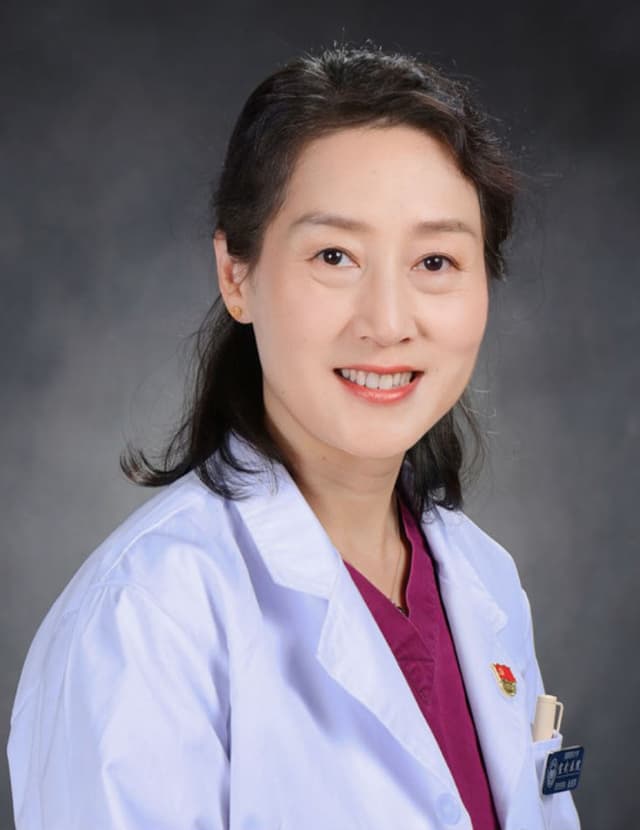
Psychodermatology in China
Professor, chief physician, doctoral supervisor
Director of department of Dermatology, Xuanwu Hospital, Capital Medical University
Director of Chinese psychodermatologist working group
Chief Chinese translator of series monograph of psychodermatology, which including ‘Stress and Skin disorders’, ‘Essentials of Psychodermatology’, ‘Psychodermatology-The Psychological Impact of skin Disorders’ and ‘Clinical Cases in Psychocutaneous Disease’.
15:28 - 15:30

The Orphan Child of Dermatology: Psychodermatology in Turkey
Cemre Busra Turk
15:37 - 15:45

Kazakhstan experience in the Psychodermatology Development
Assel Markabayeva MD, MMED
15:51 - 16:00

The psychodermatology Diploma
Françoise Poot
16:06 - 16:07

Patient Perspective 8
Silvia Fernandez Barrio
16:08 - 16:18

Panel Discussion PSYCHODERMATOLOGY AROUND THE WORLD
Dr. Dimitre Dimitrov is a Consultant at Sheikh Khalifa Medical City, UAE. He Specialized in Dermatology. He has a special interest in Psychodermatology.
CONCLUSION
16:18 - 16:18

Patient Perspectives - Closing comments
Professor at Central Michigan University in Saginaw, Michigan. My areas of interest Psychodermatology and Psychiatric aspects of hair disease. Psychotrichology, Skin picking and delusions of parasitosis are my other areas of interest and expertise. I am currently Executive Secretary of Association for Psychocutaneous Medicine of North America. I am author and editor of several books on Psychodermatology.
16:19 - 16:20

Congress conclusion
Professor at Central Michigan University in Saginaw, Michigan. My areas of interest Psychodermatology and Psychiatric aspects of hair disease. Psychotrichology, Skin picking and delusions of parasitosis are my other areas of interest and expertise. I am currently Executive Secretary of Association for Psychocutaneous Medicine of North America. I am author and editor of several books on Psychodermatology.
PRESENTATION HIGHLIGHTS
,
Might interest you
.jpg&w=640&q=75)
Nail
Nail Disorders Management
Chair: Prof. Noureddine Litaiem, MD
This specialized course offers a comprehensive update on Nail Disorder diagnosis and treatment, featuring six expert-led modules covering inflammatory conditions, infections, cosmetic aspects, tumors, surgical techniques, and pediatric nail disorders.
Through video lectures and self-assessments (10 MCQs), participants will enhance their clinical skills in identifying and managing various nail pathologies. The program is designed for dermatologists and healthcare professionals seeking to advance their knowledge of contemporary approaches to nail disease management.
Format: Online self-paced learning
Assessment: Multiple-choice questions (MCQs)
Outcome: Certificate of completion upon finishing all modules and assessments

Pigmentation
Pigmentation
Chair: Dr Patrick HUANG,
Hyperpigmentation is excess skin color from melanin. Understand melanin synthesis mechanisms and main causes.

Neglected Tropical Disease
Neglected Tropical Skin Diseases
Chair: Dr. Prajwal Pudasaini, MD
Neglected tropical skin diseases affect poor populations in tropical areas. They include leprosy, mycetoma, and cutaneous leishmaniasis, causing disability and stigma. They receive little attention and resources, leading to poor diagnosis and treatment. Increased awareness and improved healthcare access are needed to help affected communities.

TCM Chinese Medicine
Acne Treatment in China
Chair: Prof. Haiping Zhang, PhD
Acne treatment in China combines traditional methods with modern practices.
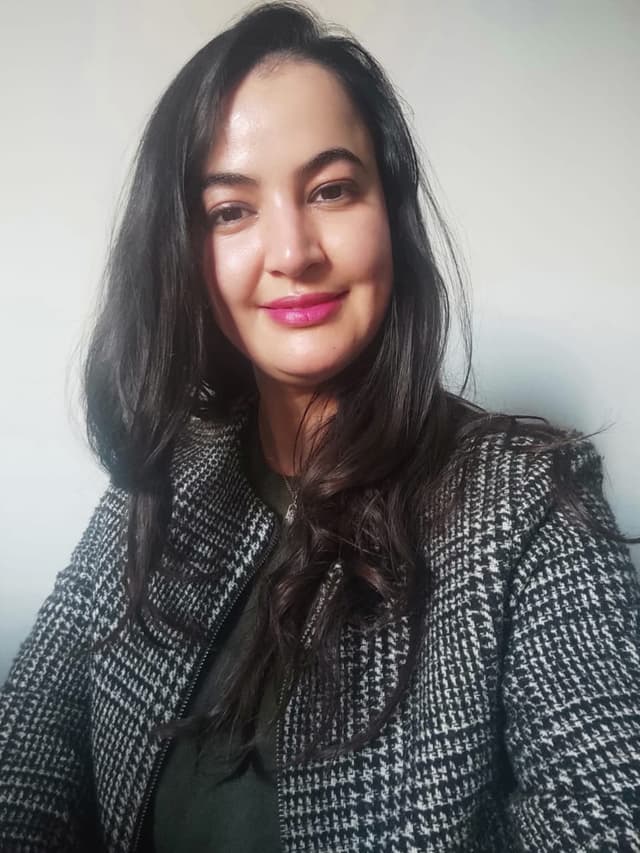
Dermoscopy
Comprehensive Dermoscopy for Dermatological Practice
Chair: Prof Awatef Kelati, MD
This comprehensive dermoscopy course provides dermatologists and healthcare professionals with essential skills in skin lesion evaluation, covering fundamental principles through advanced diagnostic applications across five key areas: global dermoscopy practices, pigmented lesion analysis (including differentiation of benign and malignant patterns), specialized techniques for skin of color, skin cancer detection (melanoma and non-melanoma), and general dermatological conditions (inflammatory, infectious, and hair/nail disorders). Participants will develop proficiency in recognizing diagnostic patterns, adapting techniques for diverse skin types, and applying dermoscopic algorithms, ultimately enhancing their clinical accuracy through a combination of theoretical knowledge and practical case-based learning. The course emphasizes real-world application, addressing both common and challenging scenarios in dermatological practice.
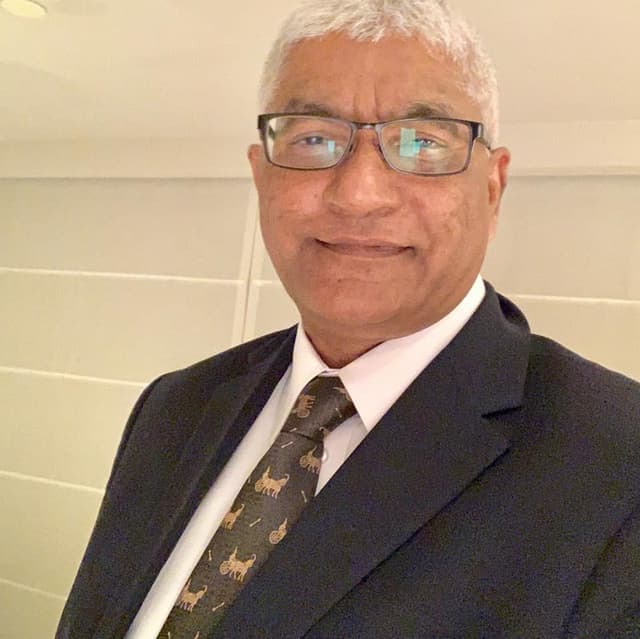
Psychodermatology
Psychodermatology
Chair: Prof Mohammad Jafferany, MD
This specialized course explores the vital intersection between dermatology and mental health, equipping clinicians with the knowledge and tools to manage psychodermatological conditions effectively. Through a blend of theoretical knowledge and practical application, participants will learn to diagnose and treat dermatological delusional disorders, identify psychiatric comorbidities in skin disease patients, and implement mental health strategies for chronic dermatoses. The curriculum also examines psychological factors in cosmetic dermatology and provides cutting-edge screening techniques for body dysmorphic disorder, including modern digital manifestations like Zoom dysmorphia. Adopting a patient-centered approach, the course emphasizes multidisciplinary management of conditions where psychological and dermatological factors interact. Participants will gain expertise in recognizing psychiatric components of skin diseases, addressing the emotional
burden of chronic conditions, and applying ethical principles in cosmetic practice. The training combines expert instruction with case-based learning to bridge theory and clinical practice. Designed for dermatologists, psychiatrists, psychologists, and primary care providers, this program enhances clinicians' ability to deliver holistic care that addresses both the visible and invisible aspects of skin disorders. Upon completion, practitioners will be better prepared to manage complex psychodermatological cases while improving patient outcomes through integrated mind-skin healthcare.
